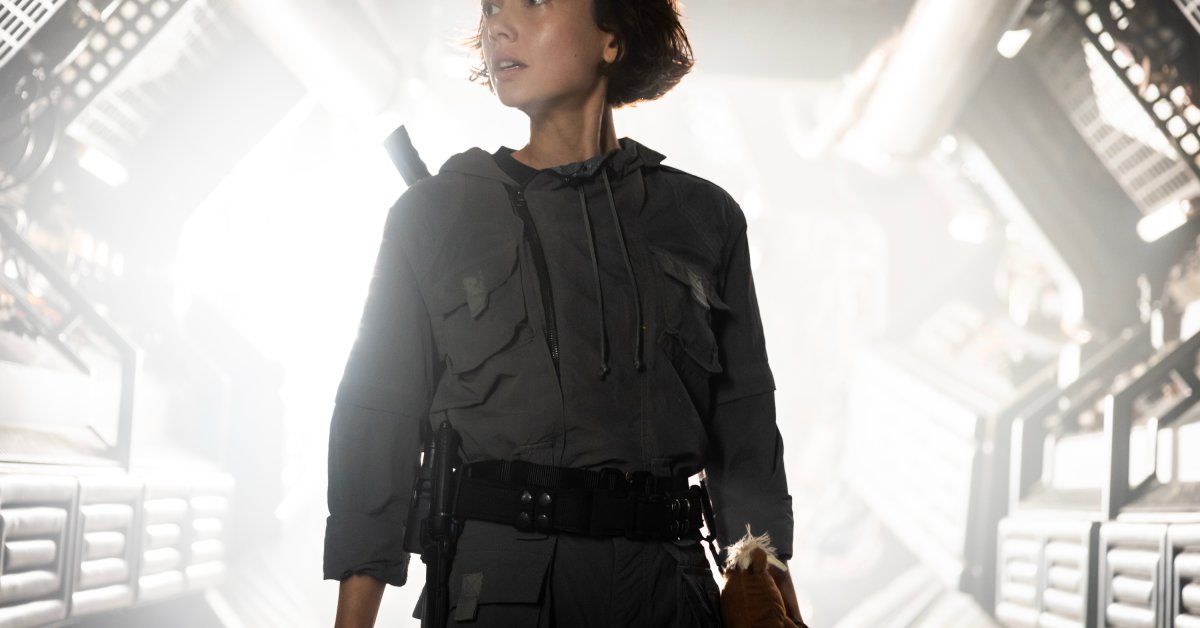A spacecraft hurtling through the cosmos. An indomitable female lead. Armed crew members creeping through dim, claustrophobic hallways where death could be lurking around any corner. A hostile alien that looks like a giant, bullet-headed scorpion in fetish gear and bleeds acid the color and consistency of infected snot. That ominous drip of extraterrestrial drool.
These are the hallmarks of the Alien franchise, which have remained mostly consistent across the seven movies (plus two vacuous Alien vs. Predator crossovers) that have kept those terrifying Xenomorphs coming back to our screens every decade since the original premiered in 1979. Yet Alien has always been an elastic property. In 1986, James Cameron followed up Ridley Scott’s minimal work of cosmic horror with Aliens, an action spectacle for a maximalist era. Hero Ellen Ripley’s (Sigourney Weaver) lonely fight for survival gave way to a military mission to vanquish aliens ravaging a human colony; Cameron filled the frame with cocky Marines, boxy space tanks, and an adorable orphan who finds in Ripley a surrogate mother. Both films rank among the best in their respective genres.
Subsequent features haven’t been nearly as successful. In the ’90s, David Fincher (Alien 3) and Amélie director Jean-Pierre Jeunet (Alien Resurrection), working from a script by Joss Whedon, mishandled the intellectual property. Even Scott’s intriguing but convoluted 2010s origin stories and 2024’s adequate Alien: Romulus (soon to be followed by a sequel of its own) do little to dispel the impression that the franchise’s heyday ended 39 years ago.

Especially in light of this history, FX’s fantastic Alien: Earth—a prequel to Scott’s movie that is also the first live-action Alien series—is a remarkable achievement. But I wouldn’t call it a surprise. With ambitious small-screen takes on the Coen brothers masterpiece Fargo and the Marvel superhero Legion under his belt, the show’s creator, Noah Hawley, has built a reputation on reinvigorating hard-to-adapt IP in series fueled by profound insight into what makes a decades-old story relevant now. In the case of Earth, premiering Aug. 12, the subjects of artificial intelligence and corporate overreach provide more than enough fodder for cerebral sci-fi horror grounded in the anxieties of 2025.
Set in 2120, two years before Scott’s Alien, Earth opens with parallel storylines. In space, the crew of the Maginot (whose name forebodingly references France’s expensive but futile World War II Nazi defense) awakens from years of cryogenic slumber in preparation for a return to Earth. Their precious cargo, to be delivered to the franchise’s canonical evil megacorp, Weyland-Yutani, is a menagerie of novel life forms, including some familiar-looking eggs. Of course, things go sideways. The creatures kill everyone except cutthroat security officer Morrow (Babou Ceesay), a cyborg. Meanwhile, on a terrestrial island called Neverland, trillionaire wunderkind Boy Kavalier (Samuel Blenkin) is using a secret technology he developed to transfer the consciousnesses of terminally ill children into synthetic, superhuman, theoretically immortal humanoid bodies. The first of these hybrids, our Ripley surrogate, christens herself Wendy (Sydney Chandler); in keeping with the Peter Pan theme, the kids she shepherds through the process will be named for Lost Boys.
These plots literally collide when the Maginot falls to Earth, crash-landing in a city controlled by Kavalier’s upstart company, Prodigy. (Viewers who remember the ’90s may have intrusive thoughts of an AOL alternative with the same name.) Along with the many casualties, the accident has geopolitical as well as business implications. In the show’s timeline, the world is ruled by a tenuous alliance of five massive companies, of which Yutani and Prodigy are two. Their rivalry in the race to immortality will ultimately decide the fate of the universe. A 22nd century disrupter in the mold of Uber or Airbnb, Prodigy is all-in on hybrids. Yutani may be plundering the wildlife of far-off planets in hopes they possess the secret to eternal life.

Hawley uses this setup to reestablish the atmosphere Alien fans have come to expect: the tight corridors, the jump-scare attacks, the gross creatures, even the alien drool. Aesthetics have always been paramount to the franchise, particularly in Scott’s movies; cybergoth artist H.R. Giger was famously instrumental in designing the look of the original, including the Xenomorph itself. Earth features similarly murky visuals and fearsome monsters, many original to the show. Just as eerie is its sound design, which evocatively captures, for instance, the squish of a scalpel slicing through alien flesh. Yet after a riveting first half of the premiere, too many slow-burn action and horror sequences all but arrest the development of the plot and characters until Episode 3.
But the fourth episode is a revelation. Enthralling in its setup of a war between two psychopathic corporations that doubles as a battle for control of Earth, it’s also rich with insight into the peculiar interiority of Wendy and the Lost Boys—who look like adults but see the world as kids, express emotions but reside in robotic bodies physically and mentally enhanced beyond the capacity of any mortal. (“What makes them geniuses is the fact that they’re children,” Kavalier, now a young adult, theorizes. “Because children have access to a world of infinite imagination.”) Are they humans, robots, or both? “We took the minds of children and put them in synthetic bodies,” a scientist overseeing the project, Arthur (David Rhysdahl), frets to his wife and colleague, Dame Sylvia (Essie Davis). “If we did this wrong, we got a bunch of AIs running around thinking they’re human. Worst case? We killed six kids.” From there, like a spaceship fleeing to the safety of its home solar system, Earth is firing on all cylinders: narrative, stylistic, psychological, philosophical.

“Science fiction has one main question,” Hawley argued in a recent interview, “And that question is whether humanity deserves to survive—in all these stories of the first contact or going out into the universe and meeting species that are either smarter than us or more deadly than us.” This dilemma consumes what might be the most internationally influential sci-fi work of the current century, Chinese author Cixin Liu’s The Three-Body Problem, which Netflix adapted last year as an English-language series. Even the new Superman movie flirts with the idea that our fractious species might be improved by an infusion of alien seed into the gene pool. As the climate crisis escalates, as deaths keep mounting in Gaza, Ukraine, and Sudan, as authoritarianism trends, it’s not hard to see why storytellers are framing the prospect of extraterrestrials annihilating—or fundamentally altering—humanity as a potentially positive outcome for the planet, if not the universe.
In Earth, that questioning takes the form of Hawley’s critique of hypercapitalism and ambivalence toward AI. The Five, as the ruling syndicate is called, exerts unchecked financial and legal power over Earth’s population. When Wendy’s human brother Hermit (Alex Lawther), a Prodigy technical officer and medic, appeals to the company to release him from his contract so he can fulfill his dream of attending medical school, a synthetic arbitrator coldly rejects his request. Conceived before Donald Trump’s return to Washington but rife with resonance about Elon Musk’s stint there, the scene illustrates the dehumanizing potential of AI-abetted corporate supremacy.
What, you may ask, does this all have to do with aliens? Well, you can’t spell alien without AI; androids have always been part of the franchise, though the timely anxiety about human-synthetic hybrids is new. In Earth, the two are more thematically linked than ever. Both are superintelligent, lethal, existential threats to humanity—for which humanity has no one to blame but itself. Though one is a human innovation and the other hails from a distant world, neither would’ve posed a danger had greedy tech barons not released them from the Pandora’s box of scientific progress. Some of the series’ most subtly chilling scenes show aliens manipulating their captors with the ease of a person commanding a well-trained dog. So it makes sense that Wendy, who is at first fixated on reuniting with Hermit, comes to wonder whether she might feel more of an affinity with the specimens in the lab.

By reframing aliens as a mirror of and metaphor for AI, while calling back to Aliens’ villain, a murderously self-interested Weyland-Yutani employee (played by Paul Reiser as the archetypal ’80s yuppie), Earth preserves the franchise’s best tropes but also expands and updates its palette of ideas. Hawley has described his exploration of “humanity and the terrible things that we do to each other” as a form of “moral horror” layered beneath the “body horror or creature horror.” The latter are still very much present, in new iterations of the movies’ perennial pregnancy ick; one of the best episodes of the season could stand alone as a mini Alien feature. But it’s the moral horror that makes Earth more than another goopy interplanetary melee.
Hawley worked from a similar playbook with Legion, whose apparently schizophrenic superhero filtered a fast-evolving cultural conversation around mental illness through a psychedelic kaleidoscope, and especially Fargo. A quirky, darkly comedic crime anthology set, like the film, in a snowy Midwest, Fargo has cannily applied the Coens’ good-vs.-evil framework to discourse around such fraught topics as gender and race. Hawley places infinite trust in his audience’s intelligence and patience. Occasionally, as in the obscurity of Legion’s later episodes or the plodding pace of some Fargo plots, this approach can verge on self-indulgence. But mostly, at a time when some streamers tailor their programs to avoid confusing viewers glued to their phones, it’s refreshing to watch TV that treats you like an adult.
Fargo’s most haunting image comes at the very end of Season 3, written around the time of the 2016 election. An avatar for good and an embodiment of evil sit face-to-face, locked in an eternal clash of wills. “There is a sense to which this year’s Fargo is really a mirror reflecting our reality back to us at this moment in time, but we don’t know how it’s gonna end,” Hawley said when it aired. If that show suggests he’s a moralist—one caught between optimism and pessimism about not just whether humanity will prevail, but about whether we should—Alien: Earth confirms it. And in this four-way staring contest that pits people against corporations, AI, and aliens, the permeable mammalian eye faces stiff competition indeed.








